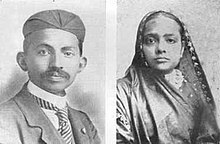Kasturba Gandhi
This article has multiple issues. Please help improve it or discuss these issues on the talk page. (Learn how and when to remove these messages)
|

Kasturba Mohandas Gandhi (born Kastur Kapadia; 11 April 1869 – 22 February 1944) was the wife of Mohandas Karamchand Gandhi. In association with her husband, Kasturba Gandhi was a political activist fighting for civil rights and Indian independence from the British.
Early life and background
Born to Gokuladas and Vrajkunwerba Kapadia of Porbandar, little is known of her early life.[1] Kasturba was married to Mohandas Karamchand Gandhi in an arranged marriage in 1883.[2] While Gandhi was still in high school, he was married, at the age of thirteen, to her, who was also of the same age. For a boy of that age marriage meant only a round of feasts, new clothes to wear and a strange and docile companion to play with. But he soon felt the impact of sexuality which he has described for us with admirable candour. The infinite tenderness and respect which were so marked a characteristic of his attitude in later life to Indian women may have owed something to his personal experience of "the cruel custom of child marriage", as he called it. [3]
When Gandhi left to study in London in 1888, she remained in India to raise their newborn son Harilal Gandhi. She had three more sons: Manilal Gandhi, Ramdas Gandhi, and Devdas Gandhi.
Political career

Working closely with her husband, Kasturba Gandhi became a political activist fighting for civil rights and Indian independence from the British. After Gandhi moved to South Africa to practice law, she travelled to South Africa in 1897 to be with her husband. From 1904 to 1914, she was active in the Phoenix Settlement near Durban. During the 1913 protest against working conditions for Indians in South Africa, Kasturba was arrested and sentenced to three months in a hard labour prison. Later, in India, she sometimes took her husband's place when he was under arrest. In 1915, when Gandhi returned to India to support indigo planters, Kasturba accompanied him. She taught hygiene, discipline, health, reading, and writing.
Health and death



Kasturba suffered from chronic bronchitis due to complications at birth. Her bronchitis was complicated by pneumonia. [citation needed]
In January 1944, Kasturba suffered two heart attacks after which she was confined to her bed much of the time. Even there she found no respite from pain. Spells of breathlessness interfered with her sleep at night. Yearning for familiar ministrations, Kasturba asked to see an Ayurvedic doctor. After several delays (which Gandhi felt were unconscionable), the government allowed a specialist in traditional Indian medicine to treat her and prescribe treatments. At first she responded, recovering enough by the second week in February to sit on the verandah in a wheel chair for a short periods, and chat. Then came a relapse.
To those who tried to bolster her sagging morale saying "You will get better soon," Kasturba would respond, "No, my time is up".
See also
References
- ^ Gandhi, Arun and Sunanda (1998). The Forgotten Woman. Huntsville, AR: Zark Mountain Publishers. p. 314. ISBN 1-886940-02-9.
- ^ "Biography of Kasturba Gandhi, Indian Freedom Fighter". India Video. Retrieved 10 February 2013.
- ^ http://www.mkgandhi.org/bio5000/birth.htm. Retrieved 22 January 2014.
{{cite web}}: Missing or empty|title=(help)
